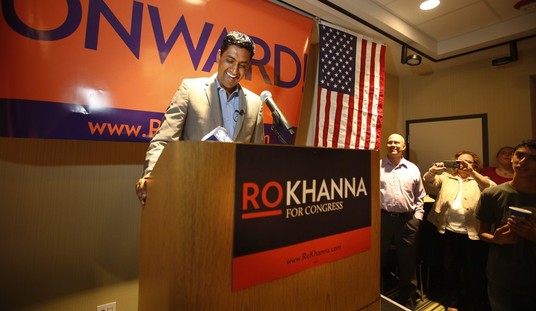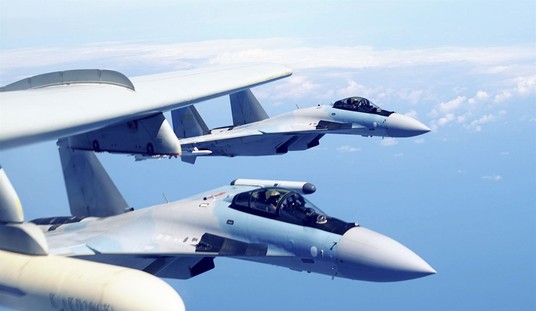Vladimir Putin has become more standoffish as of late regarding the so-called “pro-Russian separatists” in eastern Ukraine, but he’s not getting soft in the face of sanctions, either. Earlier today, Putin cut off Ukraine’s credit with Gazprom, insisting that any future purchases of natural gas would require cash up front:
Russia will only deliver gas to Ukraine only if it pays in advance starting from next month, President Vladimir Putin said in a letter released Thursday, raising the pressure on the struggling neighbor.
Putin first warned in April that Russia would do so, in a letter to European leaders whose nations are customers of Russian state-controlled Gazprom natural gas giant. He said Moscow would have to demand advance payment if Ukraine failed to start settling its mounting gas debt.
In the second letter released by the Kremlin Thursday, Putin said that a meeting involving Russian, Ukrainian and the European Union officials has failed to settle the issue. Putin said that Ukraine’s gas debt to Russia has kept rising and has reached $3.5 billion.
“Given the circumstances, the Russian company has issued an advance invoice for gas deliveries to Ukraine, which is completely in accordance with the contract, and after June 1 gas deliveries will be limited to the amount prepaid by the Ukrainian company,” Putin said in the letter.
This is the main economic hold that Russia has on Ukraine, but it won’t last for long. The EU and the US may end up paying the bill on behalf of Ukraine in the form of short-term loans, and further economic aid could allow Ukraine to pay up front for its resources. In the long run, this move will incentivize the EU to start producing more of its own natural gas resources to wean itself off of dependency on Russia, and that’s not going to make Gazprom stronger. The question will be whether Ukraine can hold out long enough to make the transition, because it will take years for the EU and the US to get into position to replace Gazprom’s supply.
The EU responded with an economic message of its own:
Lending to Russia by the European Bank for Reconstruction and Development could drop as the economy slows, the bank’s head said on Thursday, while it may step up loans to countries at risk of economic damage from the Russia-Ukraine crisis.
EBRD funding in Russia slumped last year to 1.8 billion euros ($2.5 billion) from 2.6 billion in 2012 due to what the development bank termed “difficult investment conditions”.
Its president, Suma Chakrabarti, said it could now drop again this year.
“It could impact on our business volumes in a country the size of Russia if the economy keeps slowing because investment then slows,” Chakrabarti told reporters at the bank’s annual meeting in Warsaw. …
“That may play out in the EBRD, it hasn’t yet,” he said. “The shareholders bought into my argument that the EBRD has been a force for good in Russia. We will see what the future holds, but not yet.”
EBRD said it had no plans to stop lending altogether, but the implications are clear enough. If Ukraine needs credit because of Russian demands on natural gas, it may come from EBRD, and that’s going to have some impact on its other lending. Chakrabarti is clearly leaving that as an open option while squeezing Putin of vital Western funds to keep his economy from tipping over into recession.
Other than that, AFP reports, Putin’s vision for a “New Russia” is taking shape as he foresaw. A month ago, Putin mentioned this vision in a live television show, and the separatists in Ukraine heard him loud and clear:
While denying Russian troops were in the restive regions, Putin recalled that after its conquest in tsarist times the territory from Donetsk to Odessa was known as Novorossiya — New Russia.
Won by Russia in famous battles led by Catherine the Great and her favourite Grigory Potemkin, eastern and southern Ukraine only ended up as part of the country after the territory was transferred by the Bolsheviks in the 1920s, Putin said.
“Why they did this, God only knows,” he lamented.
After the weekend votes in the east, the rebels moved quickly to stake their claim to joining Russia, with Donetsk separatist chief Denis Pushilin declaring they were seeking to “restore historic justice” — echoing a term Putin used to describe Russia’s annexation of Crimea in March. …
The “New Russia” idea has taken hold in the regions however, with the self-styled governor of Donetsk, Pavlo Gubarev, using the term this week.
He told the Russia-24 news channel the newly declared “People’s Republic of Donetsk” was “only the first step towards the great New Russia in the ‘ex-east of Ukraine’.”
That parallels the historical justification as Putin used for Crimea. The argument in March was that the transfer of Crimea was a bureaucratic bungle during the Nikita Khrushchev era. Putin is simply setting the argument back about 30 years. The signal to separatists in the Novorossiya region could hardly have been clearer.
Putin is continuing to proceed along the ethnicity-determines-sovereignty track. The Baltic states had better be prepared for what’s coming after Putin finishes up his conquest in Ukraine, and that may be sooner than one would imagine. NATO pointed out yesterday that Russian troops haven’t budged from the Ukraine border, despite Putin’s claims:







Join the conversation as a VIP Member